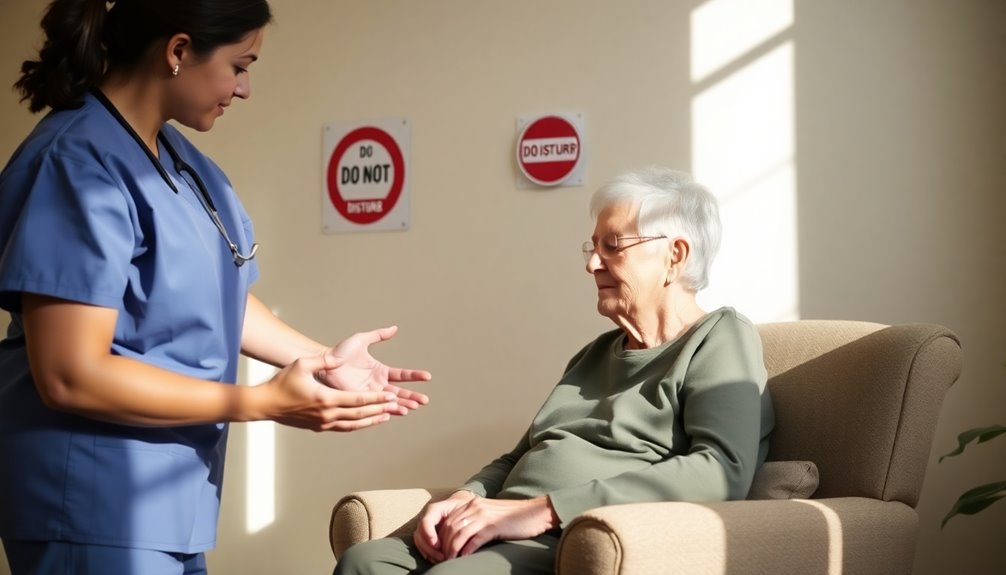Caregivers aren’t allowed to administer medications, operate specialized medical equipment, or provide medical assessments. You can’t manage your clients’ finances or sign legal documents on their behalf. Engaging in personal relationships or accepting significant gifts from clients is also off-limits. These boundaries help maintain professionalism and guarantee client safety. Understanding these restrictions is essential for performing your role effectively, and there’s more to explore about the responsibilities and challenges caregivers face.
Key Takeaways
- Caregivers cannot administer medications or perform medical procedures without proper training and certification.
- They are prohibited from managing clients’ financial accounts or signing legal documents on their behalf.
- Caregivers must not engage in personal relationships with clients to maintain professional boundaries.
- They cannot operate specialized medical equipment without the necessary qualifications.
- Sharing clients’ personal information is strictly forbidden to protect their privacy.
Understanding the Role of Caregivers

Understanding the role of caregivers is essential, especially since they provide indispensable support without crossing certain boundaries.
As part of the care team, you must prioritize clients’ safety by adhering to specific guidelines. This means you can’t provide medical services, manage financial matters, or sign legal documents for clients. Maintaining boundaries is important; engaging in physical or emotional relationships with clients can compromise professionalism and ethical standards.
Always guarantee clients are supervised if they require assistance, safeguarding their dignity and well-being. Additionally, you must respect clients’ privacy by not sharing their personal information.
Key Responsibilities of Caregivers

As a caregiver, you play an essential role in enhancing your clients’ daily lives through various important tasks. Your primary responsibilities include providing personal care, such as assisting with hygiene, dressing, and grooming.
You also prepare meals, ensuring they meet dietary needs, which is critical for your clients’ health. Maintaining a clean living environment is another key aspect of your role, promoting independence and well-being.
Additionally, you offer companionship by engaging in meaningful conversations and activities, which supports emotional health. Transporting clients to errands and appointments helps them stay active in the community.
Remember to uphold professional boundaries, avoiding personal or financial relationships to maintain ethical standards in caregiving. Your dedication greatly impacts their quality of life. It is essential to reflect on your caregiving personal motivations and benefits regularly, ensuring they align with the needs of those you’re supporting. By keeping these boundaries intact, you foster trust and respect, which are fundamental to effective caregiving. Ultimately, maintaining professionalism not only protects your clients but also enhances your growth and satisfaction in this rewarding field.
Medical Tasks Caregivers Are Prohibited From Performing

As a caregiver, you need to know the limits of your role when it comes to medical tasks.
You’re prohibited from administering medications or operating specialized medical equipment without proper training.
Always remember, medical duties must be handled by qualified professionals like registered nurses or licensed practical nurses.
Medication Administration Restrictions
While caregivers play a vital role in supporting clients, there are strict limitations on what they can do regarding medication administration. Unlicensed caregivers, like home health aides, can’t administer medications or alter dosages. This is because they lack the training needed to guarantee safety.
| Task | Allowed | Not Allowed |
|---|---|---|
| Medication reminders | Yes | – |
| Administer injections | – | No |
| Mix medications | – | No |
It’s essential for clients to rely on medical professionals for these tasks. Caregivers can assist with reminders and support, but they must avoid any actions that could jeopardize client safety.
Medical Equipment Limitations
Caregivers must also be aware of their limitations when it comes to operating medical equipment. As an unlicensed caregiver, you can’t administer medications, injections, or operate specialized devices like ventilators without proper certification and training.
Tasks such as changing sterile dressings or managing complex wounds require extensive medical knowledge to prevent complications. It’s vital to defer any medical assessments or diagnoses to qualified professionals, like registered nurses or licensed practical nurses.
Engaging in medical duties outside your scope can lead to legal or ethical repercussions, including job loss and potential lawsuits. Adhering to state regulations defining your responsibilities is significant for maintaining client safety and ensuring professional integrity in home health care.
Financial and Legal Boundaries for Caregivers

When maneuvering through the complex landscape of caregiving, it’s crucial to recognize the financial and legal boundaries that safeguard both clients and caregivers.
You can’t manage your clients’ bank accounts or investments, as doing so could lead to conflicts of interest and financial exploitation. Signing legal paperwork on their behalf is also off-limits, ensuring clients maintain their autonomy and rights.
Additionally, accepting large gifts or loans can create ethical dilemmas, undermining professional boundaries. Remember, you should only participate in financial decisions if explicitly directed by your clients.
Maintaining Professional Relationships With Clients

To maintain professional relationships with your clients, you need to establish clear boundaries from the start.
Communicating with respect guarantees that both you and your clients feel valued and understood.
Establishing Boundaries Effectively
Establishing professional boundaries is essential for fostering a healthy relationship with your clients.
Caregivers need to maintain clear limits to guarantee ethical caregiving and prevent emotional complexities.
It’s important to be aware of the following when establishing boundaries:
- Avoid physical or sexual relationships with clients.
- Respect clients’ privacy and refrain from interfering in family dynamics.
- Clearly communicate your role and the scope of assistance you provide.
- Be punctual and reliable to build trust and professionalism.
Communicating With Respect
Effective communication is crucial for building and maintaining professional relationships with clients. In care services, you must respect clients’ privacy by avoiding unnecessary intrusion into their personal matters.
Listening attentively to clients not only shows you value them but also enhances their emotional well-being. It’s important to refrain from using inappropriate language or sharing clients’ private information without consent, as this undermines trust.
When you provide companionship, make sure your interactions are respectful and professional. Open communication with clients and their families about observed changes and needs fosters a collaborative environment for effective care. Additionally, understanding individual responses vary can help you tailor your approach to each client’s unique situation.
Ensuring Client Safety and Well-Being

While caring for clients, your top priority should always be their safety and well-being.
You must guarantee client safety in every aspect of personal care and home care.
Here are key points to remember:
- Never leave clients unsupervised if they need assistance.
- Avoid any medical tasks, like administering medications.
- Maintain professional boundaries to foster a safe environment.
- Report any signs of discomfort or unsafe conditions immediately.
Consequences of Violating Caregiver Guidelines

Maintaining client safety and well-being isn’t just a best practice; it’s a fundamental expectation in caregiving.
When you violate caregiver guidelines, you risk serious consequences. Legal action can be taken against you if harm occurs, leading to job loss or disciplinary measures. If you perform tasks like administering medications without proper training, you could cause injuries and face lawsuits that result in hefty legal fees.
Unethical behavior, such as sharing clients’ private information, jeopardizes your professional reputation and future job prospects.
Additionally, neglecting safety guidelines may lead to losing your certification, halting your career.
Finally, failing to uphold responsibilities can take a toll on your emotional well-being, adding stress to your life and impacting your ability to provide the best care.
Frequently Asked Questions
What Are Things a Caregiver Should Not Do?
As a caregiver, you’ve got an essential role in supporting your clients. However, there are certain things you shouldn’t do.
You can’t administer medications or perform medical procedures without proper certification. It’s also important to avoid managing financial matters or sharing your client’s private information.
Maintaining professional boundaries is imperative, so don’t engage in personal relationships with clients.
Finally, never leave clients unattended if they need supervision, as their safety is your priority.
Do and Don’ts of a Caregiver?
Think of a caregiver as a lighthouse, guiding clients safely through life’s stormy seas.
You must embrace the do’s: show compassion, communicate clearly, and maintain professionalism.
However, you can’t stray into dangerous waters. Don’t administer medications without training, invade privacy, or engage in personal relationships with clients.
Stay vigilant and never leave those who need supervision alone.
Balancing support with boundaries keeps the light shining bright for those you care for.
When Should You Stop Being a Caregiver?
You should stop being a caregiver when the emotional strain becomes overwhelming, leading to burnout that impacts your mental health.
If your loved one’s needs surpass your abilities or require professional expertise, it’s time to seek help.
Recognizing a loss of professional boundaries or if caregiving interferes with your personal life is vital.
Finally, if you can’t guarantee your client’s safety, shifting to a more qualified caregiver is essential for everyone’s well-being.
Why Is It Common for Caregivers to Feel Guilty?
It’s common for you to feel guilty as a caregiver because you often juggle high expectations and emotional demands.
You want to provide the best care, but limitations can make you feel inadequate.
Balancing professional duties with personal life adds to the strain, leading to guilt when you can’t give enough time to either.
Plus, the pressure to maintain boundaries can leave you feeling like you’re not meeting your clients’ emotional needs.
Conclusion
In conclusion, knowing what caregivers can’t do is just as important as understanding their responsibilities. By recognizing these boundaries, you help guarantee a safe and supportive environment for everyone involved. Remember, when it comes to caregiving, it’s essential to keep things above board to avoid stepping on any toes. By adhering to guidelines, you not only protect yourself but also foster trust and respect with your clients, ultimately leading to a better caregiving experience for all.









